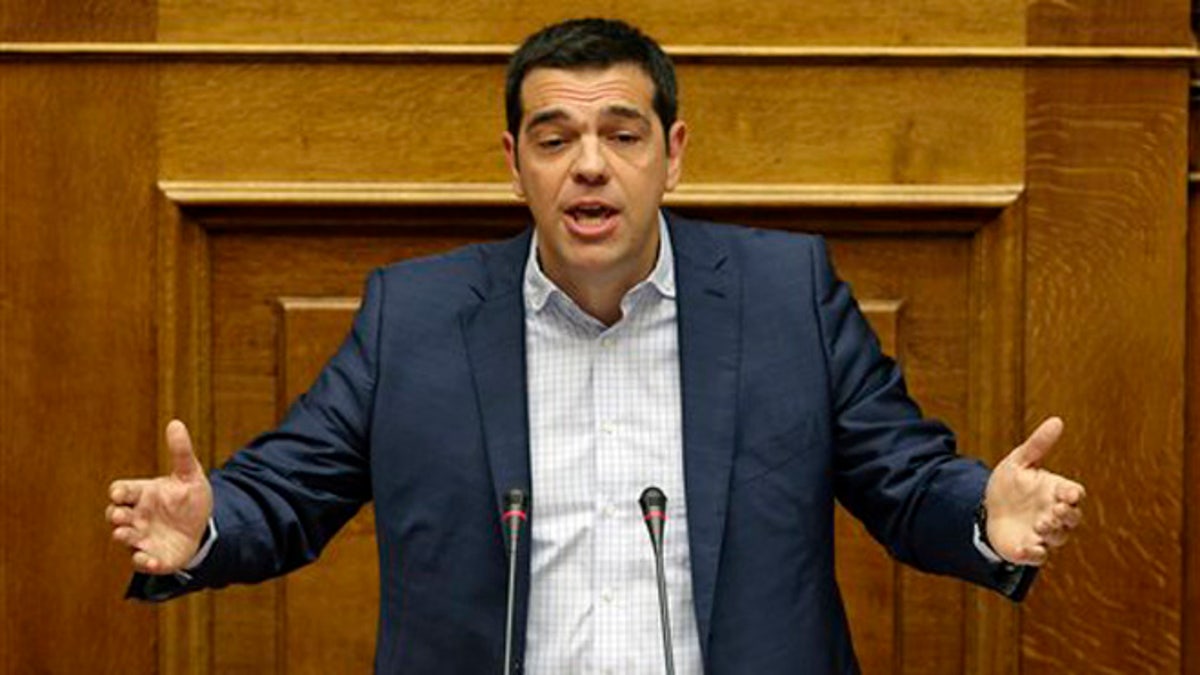
July 31, 2015: Greek Prime Minister Alexis Tsipras answers opposition questions in parliament in Athens. (AP Photo/Thanassis Stavrakis)
ATHENS, Greece – Greece's government announced that the Athens Stock Exchange will reopen Monday, a big step toward normalcy as talks with international creditors shifted into high gear.
The exchange has been closed since June 29, when the government imposed capital controls to prevent a banking collapse.
Finance Minister Euclid Tsakalotos signed the order Friday that also includes restrictions for Greece-based traders for an unspecified time period. A 60 euro limit on cash machines withdrawal will remain in place.
Tsakalotos met with lead negotiators from the European Union and International Monetary Fund to start negotiations for a third bailout worth 85 billion euros ($93 billion), following several days of preparatory meetings between lower-level officials on reforming the tax system and labor market regulations.
The third bailout will include a new punishing round of austerity measures heaped on a country reeling from a six-year recession and more than 25 percent unemployment. Prime Minister Alexis Tsipras has pledged to back the new cutbacks, while openly admitting that he disagrees with them.
"We will implement them, yes, because we are forced to," he said in parliament Friday. "But at the same time we will struggle to change them, to improve them and to counter their negative consequences."
The bailout talks with the IMF, European Commission, European Central Bank and European Stability Mechanism must be concluded before Aug. 20. That's when a debt repayment to the ECB worth more than 3 billion euros is due — money which Greece does not have.
Tsakalotos said the talks are focused on how to recapitalize Greece's battered banking system, whose deposit base was badly hit in recent months as Greeks fearing a euro exit emptied their accounts. The talks also addressed Greece's privatization commitments and budget surplus targets.
"As you can understand, there was convergence on some points, and less convergence on others," he said.
Friday's meetings came hours after Tsipras defeated a bid by dissenters in his left-wing Syriza party to push for an end to bailout negotiations and seek a return to the old national currency, the drachma.
The party's governing central committee backed a proposal by Tsipras to hold an emergency party conference in September, after the talks have been concluded.
Dissenters had sought a conference earlier, pressing the government to abandon the negotiations.
In Parliament, Tsipras defended his flamboyant former finance minister, Yanis Varoufakis, who came under heavy fire over revelations that he had drafted contingency plans for a parallel payment system that could have eased a euro exit.
"Of course I issued personal instructions to the finance minister to create a team that would work on a plan of defense in the event of a national emergency," Tsipras told parliament, answering a question from the opposition. "It would have been politically naive and irresponsible not to do so. Does that mean ... that I was seeking an emergency?" he said, angrily rejecting accusations that he had intended to take the country out of the 19-country eurozone.
Tsipras did not directly address Varoufakis' more controversial claim that he had been planning to hack into his own ministry's tax records to bypass officials allegedly under the control of Greece's creditors. Varoufakis had alleged that the aim would have been to create a parallel banking system to deal with a potential closure of the country's banks.
But Tsipras defended the former minister's integrity.
"Mr Varoufakis may have made mistakes," he said. "You can accuse him as much as you want for his political plans, for the comments he made, for not wearing tasteful shirts, for going on holiday to (the island of ) Aegina," during a key parliamentary vote. "But you can't accuse him of dishonesty."
